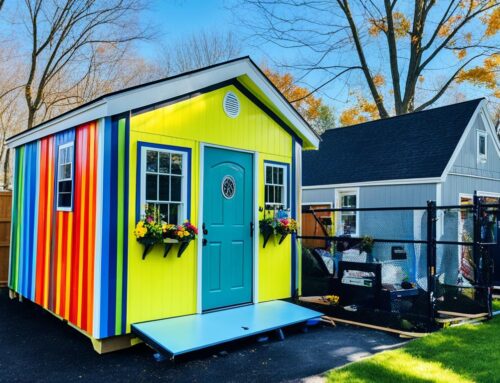Get building permits, variances, maps & COs quickly on Long Island! Call 631-492-0927 for fast service at TracisPermits.com.
Key Takeaways:
- Central Islip building permits, variances, radius maps, and certificate of occupancy help ensure compliance with minimum housing standards and building regulations.
- The Commissioner of Planning or their designee has the authority to make inspections and issue orders in accordance with building regulations.
- Plumbing and sewage drainage system requirements are important for maintaining sanitary conditions and preventing contamination.
- Non-compliance with building regulations can result in violations, stop work orders, and the need for variances.
- Architectural plans and certifications play a crucial role in demonstrating compliance with building codes and regulations.
Minimum Housing Standards in Central Islip
In Central Islip, strict minimum housing standards are in place to ensure the safety, stability, and welfare of neighborhoods and residents. These standards, established by Central Islip zoning laws and building permit regulations, provide a set of basic and uniform requirements for the condition, occupancy, and maintenance of residential premises.
The legislative intent behind these minimum housing standards is to establish a framework that promotes healthy living conditions and prevents the deterioration of residential properties. By adhering to these standards, property owners contribute to the overall well-being of the community and help create a safe and attractive neighborhood.
While these standards apply to the majority of buildings and dwellings in Central Islip, there are exceptions for certain types of structures. It’s important to understand the specific requirements that apply to your property and ensure compliance with the applicable regulations.
Exceptions to Minimum Housing Standards
Central Islip zoning laws and building permit regulations outline exceptions to the minimum housing standards. These exceptions may apply to structures such as agricultural buildings, temporary buildings, and mobile homes, among others. However, it’s crucial to note that even though certain properties may be exempt from specific requirements, they must still meet health, safety, and welfare standards set by other laws and regulations.
Importance of Minimum Housing Standards
Minimum housing standards play a vital role in maintaining the quality of residential properties and preserving a high standard of living in Central Islip. They help prevent the spread of blight, protect residents from health hazards, and contribute to the overall aesthetic appeal of the community. By adhering to these standards, property owners can ensure the longevity and value of their investments while fostering a desirable living environment.
| Minimum Housing Standards | Benefits |
|---|---|
| Establish uniform requirements for property condition and maintenance | Ensures consistency and attractiveness of the neighborhood |
| Prevent the deterioration of residential premises | Preserves property value and promotes community pride |
| Promote health and safety | Protects residents from hazards and ensures a safe living environment |
| Prevent the spread of blight | Preserves the overall appeal and desirability of the community |
Plumbing and Sewage Drainage System Requirements
In Central Islip, compliance with specific plumbing and sewage drainage system requirements is crucial for maintaining sanitary conditions and ensuring the proper functioning of residential and commercial buildings. The building permit application process includes strict guidelines to guarantee the safety and well-being of occupants. Let’s take a closer look at the key requirements:
Minimum Plumbing Standards
The plumbing system must adhere to minimum standards set by building codes to prevent contamination and ensure proper drainage. These standards encompass the installation of water-seal traps, cleanouts, and air brakes to maintain a sanitary environment. Plumbing fixtures, such as sinks, toilets, and showers, must be drained directly into an approved sewage disposal system.
Sewage Drainage System Regulations
The sewage drainage system is designed to efficiently remove waste and prevent blockages. Central Islip’s regulations dictate that all buildings must be connected to an approved public sewer system, where available. In areas without access to public sewers, alternative solutions such as septic tanks or private sewage disposal systems may be permitted, subject to specific guidelines and inspections.
Building Permit Application Requirements
When submitting a building permit application in Central Islip, it is essential to include detailed plans and documentation related to the plumbing and sewage drainage system. This may include diagrams illustrating the system’s layout, specifications of the materials to be used, and the plumbing contractor’s information. The application will undergo a thorough review to ensure compliance with all relevant regulations.
By adhering to the plumbing and sewage drainage system requirements, property owners and contractors contribute to the overall safety and health of Central Islip’s community. Failing to meet these regulations can lead to serious consequences, including fines, delays in the construction process, and potential harm to occupants.
Commissioner of Planning and Official Inspections
The Commissioner of Planning plays a vital role in the building permit process, ensuring that all construction projects comply with the necessary regulations and standards. As the authority responsible for overseeing inspections, the Commissioner or their designee has the power to assess the condition of dwellings, buildings, and premises to ensure the health, safety, and welfare of occupants and the public.
During inspections, the Commissioner or their designee has the authority to issue orders to abate hazards or dangers that pose immediate threats. This includes issuing stop work orders when necessary to mitigate risks and protect the well-being of workers and the surrounding community.
To carry out their responsibilities effectively, it is essential for the Commissioner or their designee to have access to properties. Property owners and contractors are required to provide access for inspections, allowing the Commissioner to thoroughly assess compliance with building regulations and ensure the proper execution of construction projects.
Inspectors authorized by the Commissioner must carry official identification, providing assurance to property owners and contractors that they are legitimate representatives of the Commissioner’s office. This ensures transparency and accountability throughout the inspection process, instilling confidence in the integrity of the building permit system.
Compliance, Abatement, and Cost Recovery
Ensuring compliance with building regulations is vital to maintain safety and quality standards in construction projects. Central Islip follows a structured process for addressing violations and non-compliance, which includes abatement of hazards and cost recovery.
When a violation is identified, the responsible party is given a specified compliance time to rectify the issue. The compliance time may vary depending on the nature and severity of the violation. Extensions to the compliance time can be granted under certain conditions, such as when there are practical difficulties in achieving compliance within the given timeline. It is essential for property owners and contractors to address violations promptly to avoid further consequences.
In emergencies where hazards pose an immediate threat to the health, safety, or welfare of occupants or the public, abatement measures can be implemented without delay. This ensures that prompt action is taken to eliminate or mitigate the hazards. Abatement may involve repairs, modifications, or any necessary action to correct the violation.
Costs and expenses incurred in carrying out abatement actions and addressing violations can be recovered from the responsible party. The process typically involves filing affidavits and requesting hearings to determine the amount of expenses to be recovered. If the responsible party fails to reimburse the costs, the expenses may be assessed against the land, creating a financial liability that must be settled.
Summary:
- Compliance time is given to address violations within a specified period.
- Extensions to compliance time can be granted under certain conditions.
- Abatement measures are implemented in emergencies to eliminate hazards promptly.
- Costs and expenses incurred in abatement and addressing violations can be recovered.
Table: Violation Compliance Time and Abatement Procedures
| Violation Type | Compliance Time | Abatement Procedure |
|---|---|---|
| Structural Deficiencies | 30 days | Repair or reinforcement of the structure. |
| Fire Safety Violations | 15 days | Installation of fire suppression systems or other necessary measures. |
| Electrical Code Violations | 10 days | Correction of wiring issues and compliance with electrical codes. |
| Plumbing Violations | 20 days | Repair or replacement of plumbing systems to meet regulations. |
It is crucial for property owners, contractors, and other stakeholders to understand the compliance, abatement, and cost recovery processes in Central Islip to ensure adherence to building regulations and maintain a safe environment for construction projects.
Architectural Plans and Certifications
Obtaining architectural plans and certifications is a crucial step in the building permit process. These documents play a significant role in ensuring compliance with building codes and regulations. The approval of architectural plans is required before any construction or renovation can commence, as they outline the design, layout, and structural details of the project.
Architectural plans provide a visual representation of the proposed building or structure, including floor plans, elevation drawings, and construction details. These plans must be prepared by a licensed architect or engineer, and they are subject to review by the relevant authorities to ensure compliance with zoning regulations, safety codes, and aesthetic considerations. Once the plans are approved, they serve as a blueprint for construction and guide the building process.
In addition to architectural plans, certifications are essential in demonstrating compliance with various building requirements. The certificate of occupancy (CO) is one such certification that confirms a building is in compliance with applicable codes and is safe for occupancy. It is typically issued upon the completion of construction and successful inspection by the building department.
“Architectural plans and certifications are vital documents in the building permit process, as they provide a detailed roadmap for construction and ensure compliance with regulations. These documents not only guide the construction process but also serve as evidence of adherence to building codes and standards.”
The Importance of Certifications
Another important certification is the certificate of completion, which confirms that construction work has been carried out in accordance with the approved plans and applicable codes. This certification is often required for commercial projects or major renovations. It signifies that the building has been completed to the required standards and can be occupied or utilized for its intended purpose.
The Role of TracisPermits.com
When navigating the process of obtaining architectural plans and certifications, it can be beneficial to seek the expertise of professionals who specialize in building permits and related processes. TracisPermits.com offers fast and expert service in obtaining building permits, variances, radius maps, and certificates of occupancy. Their team of professionals can assist with drafting, designing, and expediting permits, ensuring a smooth and efficient process.
In conclusion, architectural plans and certifications are integral to the building permit process, providing a blueprint for construction and verifying compliance with regulations. By partnering with a reputable service provider like TracisPermits.com, builders and property owners can streamline the process and ensure timely approval of their permits.
Violations and Sign-Off & Approval
Construction projects can encounter various violations that need to be addressed promptly. It is crucial to understand the procedures for dealing with these violations to ensure compliance with building regulations. In Central Islip, violations can range from issues related to zoning laws, building codes, or other regulations.
When a violation is identified, the responsible party may be required to legalize the project or correct any non-compliance issues. This may involve obtaining the necessary permits, variances, or approvals to bring the project into compliance with the regulations. Failure to address violations promptly can result in stop work orders, delays, and potential penalties.
One important aspect of construction projects is plumbing sign-offs. Plumbing systems must meet specific requirements to ensure the proper functioning and safety of the building. Plumbing sign-offs are necessary to confirm that the plumbing installations have been completed correctly and meet the applicable standards. This helps to prevent potential issues such as leaks, contamination, or inadequate drainage.
It is recommended to consult the relevant authorities and obtain all required sign-offs and approvals before proceeding with any construction project. This will help ensure that the project is in compliance with the applicable regulations and avoid potential violations or delays.
Site Plan Review Board
In cases where a development project involves significant changes to the site layout or land use, it may be necessary to seek approval from the Site Plan Review Board. This board reviews proposed site plans to ensure compliance with zoning laws, environmental regulations, and other requirements. Their review process helps to evaluate the potential impact of the project on the surrounding area and ensure that it aligns with the overall development goals of the municipality.
Seeking approval from the Site Plan Review Board is an important step in the construction process, particularly for larger-scale projects. It allows for a comprehensive evaluation of the proposed development and helps to address any concerns or potential issues before construction begins.
Conclusion
In conclusion, this article has provided an overview of the various aspects of Central Islip building permits, variances, radius maps, and certificate of occupancy. It has highlighted the importance of complying with minimum housing standards, plumbing and sewage drainage system requirements, and the role of the Commissioner of Planning in ensuring compliance and safety.
The article has also emphasized the significance of architectural plans, certifications, addressing violations, and obtaining sign-off and approval. For fast and expert service in obtaining building permits and related processes, readers are encouraged to contact TracisPermits.com at 631-492-0927.
Get building permits, variances, maps & COs quickly on Long Island! Call 631-492-0927 for fast service at TracisPermits.com.
FAQ
What are the minimum housing standards in Central Islip?
The minimum housing standards in Central Islip are basic and uniform standards for the condition, occupancy, and maintenance of residential premises. They aim to ensure the stability, quality, and welfare of neighborhoods and residents.
Are there any exceptions to the minimum housing standards?
Yes, there are exceptions to the minimum housing standards. These standards may not apply to certain types of buildings or dwellings.
What are the requirements for plumbing systems and sewage drainage in Central Islip?
Plumbing systems in Central Islip must be maintained in a sanitary and serviceable condition. Plumbing fixtures should be drained to an approved sewage disposal system. Water-seal traps, cleanouts, and air brakes are important to prevent contamination and maintain proper air circulation in the drainage system.
Who is responsible for making inspections and issuing orders in accordance with building regulations in Central Islip?
The Commissioner of Planning or their designee is responsible for making inspections and issuing orders in accordance with building regulations in Central Islip.
What authority does the Commissioner of Planning have in emergencies?
In emergencies, the Commissioner of Planning or their designee has the power to act and issue orders to abate hazards or dangers that pose immediate threats to the health, safety, or welfare of occupants or the public.
What should I do if I receive a violation for non-compliance with building regulations in Central Islip?
If you receive a violation for non-compliance with building regulations in Central Islip, you should follow the procedures outlined in the section. This may involve filing affidavits, requesting hearings, and potentially incurring expenses for necessary actions.
How do I obtain architectural plans and certifications for residential and commercial buildings in Central Islip?
To obtain architectural plans and certifications for residential and commercial buildings in Central Islip, it is important to have accepted blueprints. Town of Islip Expeditors can assist in drafting, designing, and expediting permits. Certificate of occupancy and certificate of completion are also significant in demonstrating compliance with building codes and regulations.
What should I do if there are violations during the construction process?
If there are violations during the construction process, you may need to address them through the process of legalizations and removal of violations. Stop work orders may be issued, and it may be necessary to obtain variances. Plumbing sign-offs and involvement of the site plan review board may also be required.












